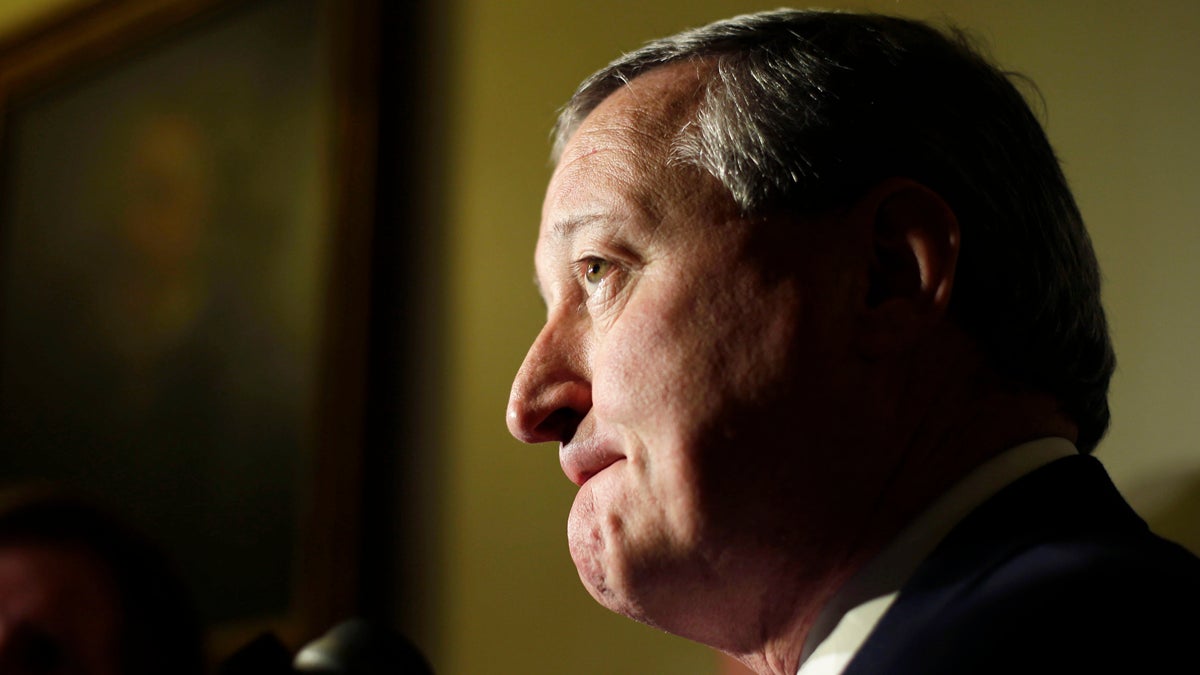Soda war resumes in Philadelphia
Listen
Philadelphia Mayor Jim Kenney plans to address the future of Philadelphia's school system in a speech Thursday. (AP file photo)
Mayor Jim Kenney’s New Deal — an ambitious set of city initiatives to educate kids early and better, and provide a better life in city neighborhoods — now has a funding source: your Mountain Dew.
Looking for new revenue to fund citywide pre-K, community schools, and a sweeping plan to improve parks, recreation centers and libraries, Kenney has returned to an idea Mayor Michael Nutter twice failed to get through City Council: a city tax on sweetened beverages, commonly known as a soda tax.
Kenney isn’t just serving up a dish Council refused to touch; he’s asking them to eat a bigger portion.
His proposed soda tax is 3 cents per ounce, higher than anything Nutter proposed. That would boost the cost of your 20-ounce soda by 60 cents if the distributor, which would pay the tax, passes the full hike along to consumers.
It could happen
But it appears Kenney begins with a fighting chance, in part because he’s begun by detailing very appealing programs he wants the tax to subsidize.
I spoke to Councilman Bobby Henon, who told me Kenney’s spending plans appeal to Council members, and traditional revenue options don’t.
“I mean nobody has any interest in raising business taxes or real estate taxes,” Henon said. “So, if there are other ways to generate some revenue with a multitude of benefits, then it should be on the table.”
It reminds me of something the late Republican Councilman Thacher Longstreth used to say when Council members searched for some innovative plan to plug a hole in the budget.
“I’ve heard this before,” Longstreth would say. “‘Don’t tax you, don’t tax me, tax that fellow behind the tree.'”
Of course, there are those who say Kenney’s proposal is indeed a business tax — just one targeted at a very specific industry.
Somebody pays
“Why this tax? Why target this industry?” said Larry Ceisler, the veteran communications and messaging man who represented bottling companies, unions and others citizens who opposed the soda tax back in 2010 and 2011.
He said Kenney is proposing to fund his programs with a tax that’s designed to discourage the consumption of the product being taxed — and is thus an inherently unreliable source of long-term revenue.
And, he said, there’s another problem, especially for a mayor who says he wants to attack poverty.
“This is a regressive tax, no doubt about it,” Ceisler said. “The tax will be carried on the backs of the working poor.”
For good measure Dan Grace of Teamsters Local 830 vowed to do everything possible to defeat the tax, calling it “patently unfair, especially to low-income citizens, single mothers and minorities” and predicting the tax will “result in the swift departures of the Pepsi and Coca-Cola operations in the city, the loss of many family-sustaining jobs, and a consumer revolt.”
They do have a point.
The tax only brings in the $400 million Kenney anticipates over the next five years if a lot of people spend more drinking stuff they shouldn’t — lots of soda, pre-sweetened tea, sports drinks and such.
I personally think there’s a strong public health argument for taxing sugary drinks, but that hasn’t carried the day in the past, and Kenney isn’t staking this proposal on it.
Battle lines form
Bottlers and their allies were able to mount so much opposition in the past that Nutter’s soda tax proposals in 2010 and 2011 never came to a vote.
But there are some differences this time. Kenney’s message is clear and appealing to many in Council. In addition, 10 of the 17 members of Council who rejected the tax before have been replaced, arguably with members more willing to consider it.
And Kenney is being careful to include Council members in the discussions early. Henon said the mayor made the case to him, and he’s open to the idea.
Henon, of course, is not just anybody. He’s Council’s majority leader, who already had to put together a majority of Council Democrats to get where he is.
Ceisler, who will again help fight the soda tax, agrees it’s a new ball game for his side.
“I think the different Council makes this more of a challenge,” he said. “I mean when you look at the political leanings of many of these Council people, when you look at the relationship between this mayor and Council people, it is a tougher task than last time.”
But Ceisler said the coalition of opponents will come back strong and work very hard.
A key question is what Council President Darrell Clarke does. Clarke opposed the soda tax when it was last proposed, but he wasn’t president then.
His spokeswoman, Jane Roh, wrote in response to my inquiry that Clarke wouldn’t respond to something he hasn’t seen.
Kenney will formally make the proposal Thursday in his first budget address, and that will open a season of political warfare that could last into May or beyond.
But if he’s going to do this, he’s smart to do it now while he has the energy and optimism of a fresh start and some popular proposals to entice support.
Game on.
WHYY is your source for fact-based, in-depth journalism and information. As a nonprofit organization, we rely on financial support from readers like you. Please give today.


